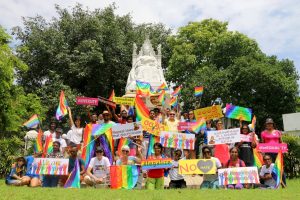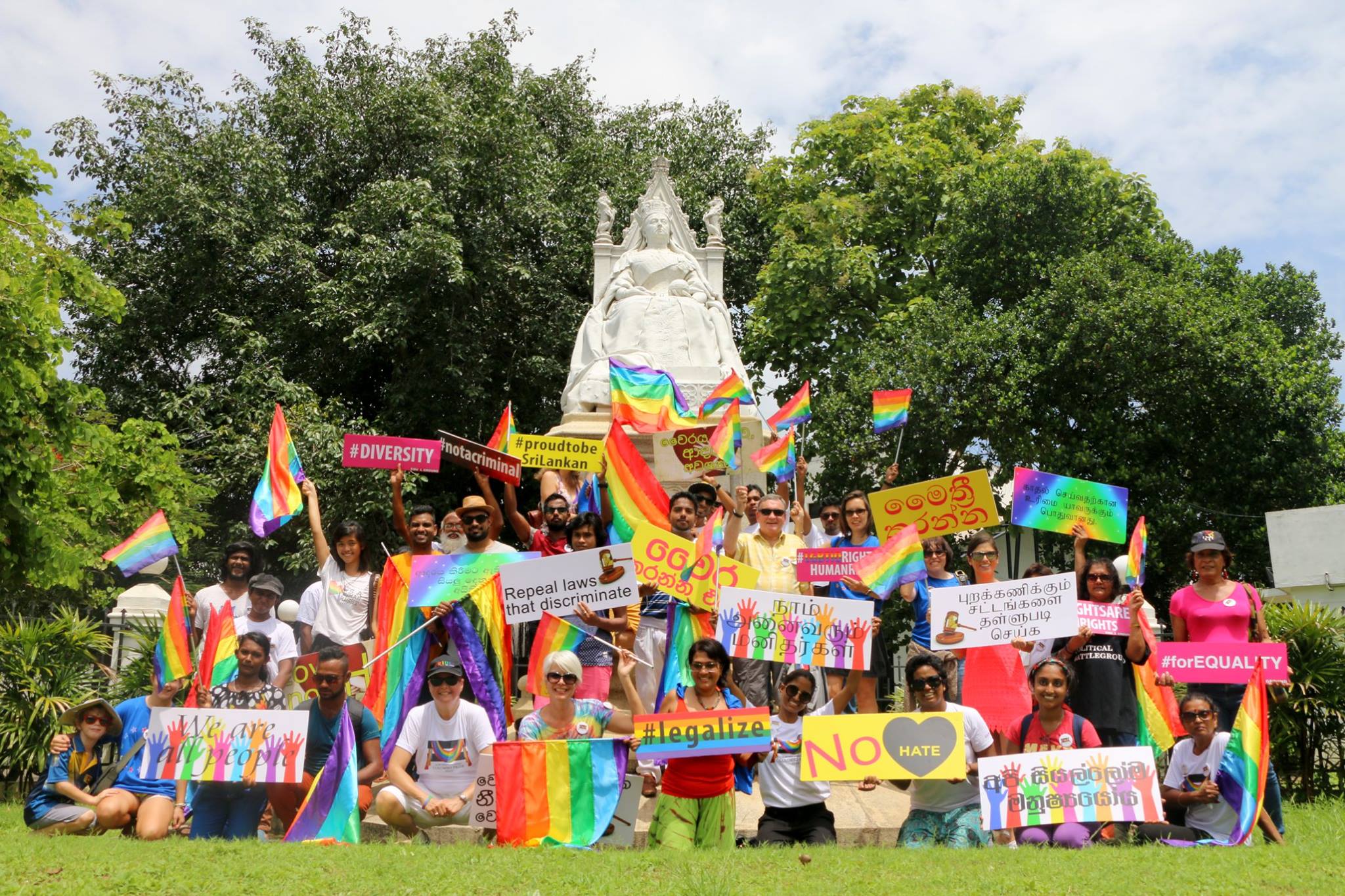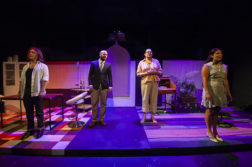THE MOOD in the air is joyous, abuzz with anticipation and camaraderie. A small group has gathered at the red double-decker bus parked on the side of the road. They set to work decorating the old hulk with rainbow flags and garlands, each new arrival bringing his or her own contribution to the project. Most are wearing identical white logo shirts; a few elicit squeals and applause when they arrive with glitter in their beards, wigs or outrageous makeup. Today’s event is the highlight of the year for many in this group, something they’ve been looking forward to with nervous expectation for months.
It’s a Saturday afternoon in June, which means gay pride celebrations are happening all over the world, but this one is different than most. This is Sri Lanka, where homosexuality is illegal. A traditional parade, with marchers taking to the streets, would end with participants arrested and jailed. Instead, this group boards an open-top tour bus to parade through the streets of Colombo, waving the rainbow flag that they can’t carry down the street on foot.
The rainbow bus parade, like the rest of the Colombo’s pride celebration, is the brainchild of Rosanna Flamer-Caldera, the noted LGBT rights activist who founded its parent organization, Equal Ground, in 2004. This was the first organization of its kind in Sri Lanka, and naturally it met with opposition from the start. Members of the gay community were actually the first detractors of Equal Ground, unhappy at the attention Flamer-Caldera was bringing to the group, which had been content to live in the shadows. The first pride celebration took place the following year and was a modest gathering. Colombo pride has now grown into a weeklong celebration encompassing the bus parade, a highly acclaimed film festival, roundtable discussions, music and dance performances, and a rainbow kite festival finale.

Flamer-Caldera states that the first four years of Equal Ground’s existence were actually the easiest, despite the hesitations of the gay community. The civil war was raging in the north of the country and commanding all of the government’s attention. The small group of activists was able to travel throughout the country unimpeded, and the roots of the organization took hold. When the war ended in 2009, things became more difficult. Flamer-Caldera and her staff were regularly harassed by government employees, and their phones were wiretapped.
A small step forward was made in January 2017 when the Sri Lankan government passed a measure to update the country’s Human Rights Action Plan banning discrimination based on sexual orientation. At the same time, they declined to decriminalize homosexuality, which is subject to the same criminal code that nailed Oscar Wilde on charges of “gross indecency” back in the 1890s, a legacy of the British Empire.* The other catchphrase concerns acts “against the order of nature,” an equally vague term—deliberately so—whose meaning is open to interpretation by police and courts.
(Section 365 begins: “Whoever voluntarily has carnal intercourse against the order of nature with any man, woman, or animal, shall be punished…” with various fines and imprisonment. Section 365A doesn’t clarify matters: “Any person who in public or in private, commits, or is a party to the commission of, or procures or attempts to procure the commission by any person of, any act of gross indecency with another person, shall be guilty of an offense…” and subject to various horrors.)
When these laws were instituted by the British 134 years ago, Sri Lanka (then called Ceylon) was tolerant of homosexuality. As a Buddhist country, tolerance of behavior that did not harm others was the norm. It is frequently noted by supporters of LGBT rights that the early kings of Sri Lanka openly engaged in homosexual relationships with the young men of their courts.
In practice, no one is ever arrested or brought to trial for homosexuality in Sri Lanka, if only because the charge would be too difficult to prove. However, coming out as gay can result in ostracism from one’s family, discrimination in housing, loss of work, rape, and physical violence. Throughout the island, ayurvedic snake oil clinics promise an easy five-week “cure” for homosexuality involving medication and physiotherapy. Parks and beaches known to be popular gay hangouts are frequently targeted by police looking for bribes and easy targets for harassment. Many gay people end up marrying a member of the opposite sex just to keep from being disowned by their family.
CHEERS erupt as the pride bus lurches forward into Saturday afternoon traffic and the brass papara band adds a jubilant soundtrack to the parade. In that moment, we could have been on a Mardi Gras float rolling through the French Quarter of New Orleans instead of on an old bus, trundling through the Sri Lankan capital on a quest for gay rights.
For ninety minutes, the pride bus rolls through the streets of Colombo, with rainbow flags and multilingual, equality-themed signs waving in the breeze. The occupants of the bus are impervious to the stone-faced stares of bystanders watching this spectacle pass by. There are a few waves and cheers, but not many. The overwhelming response from the viewing public is pointed, uncomfortable silence. Men turn away in disgust and parents pull their small children behind them so as not to witness the spectacle. It’s a different world on the bus; there is music and laughter, food, joy, and solidarity. “We did it,” that mood says. “We pulled it off.”
Activism is not a Sri Lankan ideal. Here, you go along to get along. Raising your voice is the height of rudeness. This is a decorous culture: acceptance of one’s lot in life and not making waves are valued. This is not the kind of place where people stage protests. For these brave activists to take to the streets—and to the airwaves and newspapers—demanding justice and equal rights is an assault to the system. They’re called dogs, threatened and reviled, and openly mocked. I ask Flamer-Caldera how optimistic she is about the potential for the laws changing in the future. She doesn’t hesitate. “It has to change. It will. We aren’t going away. They can kill us, but we’re not going anywhere.”
Leslie Price is the nomadic writer and blogger behind MyAdventureBucket.com.






